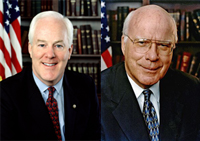Senate Judiciary Committee Approves Bipartisan Anti-Corruption Bill
 WASHINGTON (Thursday, July 28, 2011) – The Senate Judiciary Committee Thursday approved bipartisan legislation authored by Senator John Cornyn (R-Texas) and Senator Patrick Leahy (D-Vt.) that will give prosecutors new tools to identify, investigate, and prosecute criminal conduct by public officials.
WASHINGTON (Thursday, July 28, 2011) – The Senate Judiciary Committee Thursday approved bipartisan legislation authored by Senator John Cornyn (R-Texas) and Senator Patrick Leahy (D-Vt.) that will give prosecutors new tools to identify, investigate, and prosecute criminal conduct by public officials.
The Public Corruption Prosecution Improvements Act (PCPIA) will strengthen existing federal criminal law for acts of public corruption, and raise maximum statutory penalties. The bill will also clarify the definition of what it means for a public official to perform an “official act,” and amend the federal bribery statute to show that corrupt payment can be made to influence more than one official act. The legislation also amends the federal gratuities statute to make clear that a public official cannot accept anything of value given to them because of their official position other than as permitted by existing rules or regulations.
“Public corruption is not a Republican or Democrat problem. It is a problem across this country,” said Cornyn. “Our citizens deserve to be governed by the rule of law, not the rule of men. I’ve worked with Senator Leahy on several bipartisan bills and this bill is another great example of our combined effort to help clean up government and promote transparency.”
“The Public Corruption Prosecution Improvements Act will help provide important new tools to prosecutors investigating public corruption,” said Leahy. “This kind of corruption erodes the trust the American people have in those given the privilege of public service. Prosecutors and law enforcement need meaningful tools to help stamp out corruption. Senator Cornyn has been a real partner on this issue over the years, and the agreement we have reached with the bill’s sponsors in the House will, I hope, enable us to make real progress on this anti-corruption bill.”
Other key provisions of the Public Corruption Prosecution Improvement Act include an extension of the statute of limitations from five to six years for bribery, honest services fraud, and extortion of a public official. Public corruption cases are time-consuming to investigate, and the extension of the statute of limitations provides prosecutors the time necessary to investigate cases. The bill also raises statutory maximum penalties for select anti-corruption statutes to ensure the most serious corrupt acts result in significant jail time.
Leahy and Cornyn have introduced the Public Corruption Prosecution Improvement Act in each of the last three Congresses. The legislation approved by the Committee Thursday is the result of a bipartisan, bicameral agreement reached with Representatives James Sensenbrenner (R-Wis.) and Mike Quigley (D-Ill.), the lead sponsors of companion legislation in the House of Representatives.




Comments
Facebook Comments
Make sure to check out the comments on Facebook.